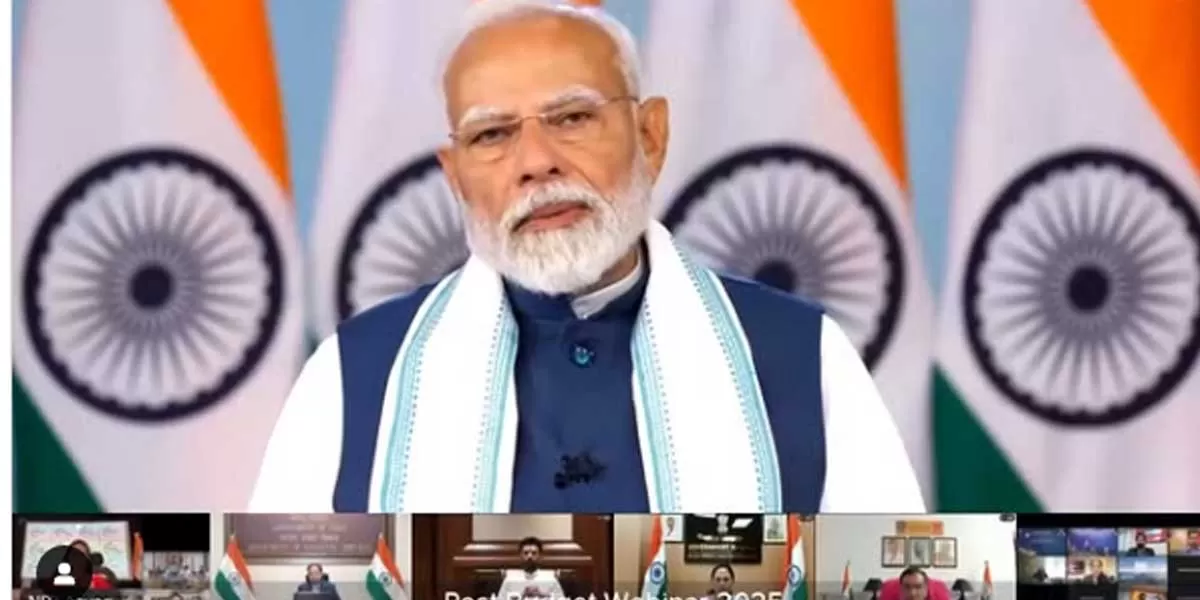As part of the Post-Budget Webinar on the Union Budget 2025-26, organised by NITI Aayog, an in-depth discussion on Manufacturing, Exports, and Nuclear Energy was held on 4 March 2025. The session on exports, led by the Ministry of Commerce & Industry in consultation with the Ministry of Electronics & Information Technology (MeitY), brought together industry leaders, exporters, policymakers, and entrepreneurs to deliberate on strategies to enhance India’s export competitiveness and global trade integration.
Prime Minister Narendra Modi addressed the gathering, underscoring the government’s commitment to fostering a robust manufacturing and export ecosystem. He emphasised the reform-driven approach of the Union Budget 2025-26 and encouraged participants to propose innovative solutions to boost India’s global trade footprint. His remarks set the stage for an insightful discussion, with stakeholders deeply engaging on key policy interventions and growth strategies.
The Breakout Session on Exports was moderated by Shri Sanjay Nayyar, President of ASSOCHAM, and featured prominent panellists, including Shri Rajesh Nambiar (President, NASSCOM), Shri Ajay Sahai (Director General, FIEO), Shri Pankaj Mohindroo (President, ICEA), Shri Kalyan Basu (Managing Director, MonetaGo), Ms. Jyoti Vij (Director General, FICCI), and Ms. Nivruti Rai (CEO, Invest India). Their collective expertise provided valuable insights into strengthening India’s exports, leveraging digital trade, and enhancing MSME participation in global markets.
A key highlight of the discussion was the Export Promotion Mission (EPM), a proposed Rs 22 billion initiative aimed at boosting India’s exports, particularly for MSMEs. The initiative seeks to provide financial incentives, market access support, and compliance facilitation. Panellists stressed the importance of a collaborative, whole-of-government approach to resolving market access challenges and supporting new and e-commerce exporters.
Further recommendations included expanding Export Credit Guarantee Corporation (ECGC) coverage to high-risk markets, enhancing collateral-free export credit through EXIM Bank, and incentivising MSMEs to adopt global sustainability standards and certifications. The expansion of Export Readiness Programmes and the E-Commerce Niryat Credit Card Scheme was also discussed as essential steps towards empowering MSMEs in digital trade.
A major point of focus was BharatTradeNet (BTN), an ambitious Digital Public Infrastructure (DPI) initiative designed to create a seamless, electronic, and paperless trade ecosystem. Stakeholders emphasised the need for institutionalising BTN as India’s digital trade backbone by integrating it with Aadhaar, DigiLocker, UPI, and financial institutions for seamless trade finance approvals. The development of a Central Trade Registry, strengthening State/District Export Cells, and expanding Buyer-Seller Meet (BSM) programmes were also proposed as vital measures to streamline export facilitation.
The session also examined the expansion of Global Capability Centres (GCCs) beyond Tier-1 cities, recommending regulatory reforms, tax incentives, infrastructure enhancements, and R&D collaborations with academia. The adoption of the GIFT City model for emerging Tier-2 cities and dedicated policy interventions for incentivising employment generation, transfer pricing rationalisation, and digital infrastructure development were key takeaways.
The discussions concluded with a closing address by Union Minister of State for Commerce and Industry, Shri Jitin Prasada, reaffirming the government’s commitment to a globally competitive export ecosystem and deeper integration of Indian enterprises into international value chains.
Industry and Market Outlook
India’s export sector is poised for transformative growth, driven by a strategic focus on digital trade, supply chain resilience, and MSME empowerment. The emphasis on BharatTradeNet, e-commerce, and digital public infrastructure aligns with global trade facilitation trends, ensuring Indian businesses remain competitive in an increasingly digitalised economy. With robust policy support, increased access to export financing, and streamlined compliance mechanisms, India is well-positioned to expand its share in international trade.
The government’s push for Aatmanirbhar Bharat and export-led growth is expected to attract global investors, foster innovation in key sectors, and drive sustainable economic expansion. As new trade agreements and global partnerships unfold, India’s proactive stance in manufacturing, exports, and technology-driven trade will cement its position as a major player in the world economy.





















